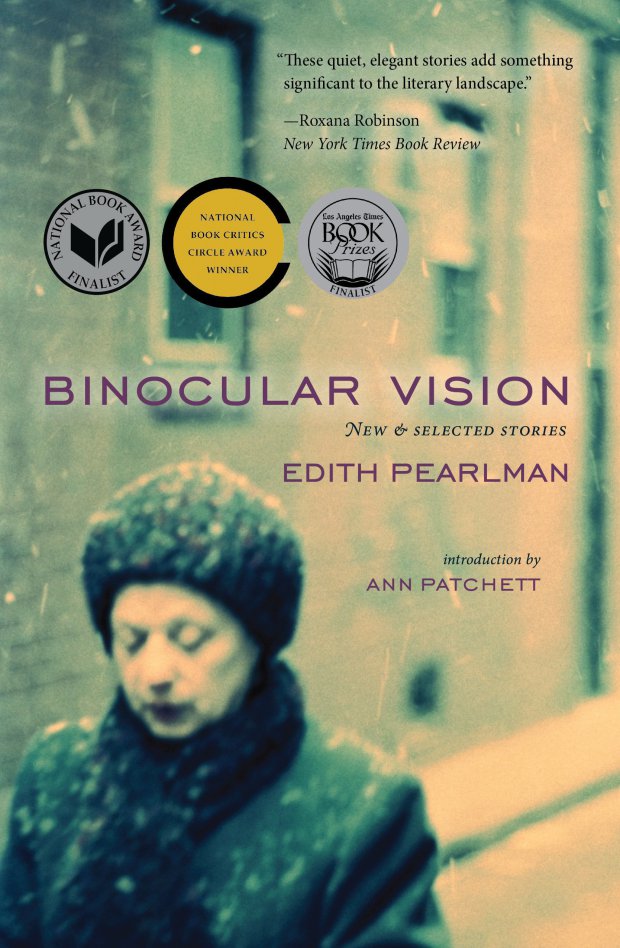Some books reach you entirely unexpectedly. Typically, I remember who recommended me books. Typically I don’t casually put a book on my reading list. But for life of me, I cannot remember where I picked up this recommendation. My best guess is, it was someone on twitter, with generic recommendation. Anyways, long story short, I picked it up a few months back, and have been moving through it leisurely, intentionally, savoring the not-so-short stories one or two at a time, to avoid saturation, which is a real risk with this collection. And it’s easily the best book of stories I’ve ever read.

A disclaimer here. I’m not that much into short stories (or not-so-short one’s for that matter). So one will have to take this contextually. But at the same time, I must add that I don’t read a lot of short stories because they don’t engage me much. However, only couple of stories into Binocular Vision, I was craving for more. And I was wondering why I had never heard of Edith Pearlman. Or to borrow words from Ann Patchett’s glowing introduction to the volume:
“To that great list of human mysteries which includes the construction of the pyramids and the persistent use of Styrofoam as a packing material let me add this one: why isn’t Edith Pearlman famous?”
Or as famous as she should be, given the quality of the writing. Maybe I’m just trying to cover up my inadequacies by asking why I hadn’t heard of her. And I’ve no pretensions of being a great reader who knows every good writer that is there. Still someone so good …
Binocular Vision has a lot of recurring themes. Many of the characters are displaced Jews. Many children are precocious, on the spectrum, geniuses with language. Many women characters are emphatic, strong, independent. There are themes of love (or “ordinary loves”), loss, loneliness, displacement/re-settlement, and understanding, and remembering. The stories are set in different times, sometimes covering different generations. There are stories of old people, of young people who cannot fit in, of children’s eye view of the world around them. But the most striking thing about the collection is how ordinary the people with these extraordinary stories are. There are no hero figures to look up to with awe. There are no easy answers. There are not too many resolutions even, just as there really never are in life — too many I mean. And maybe that’s why, the stories are as much a slice of life as you could ever hope to get from a piece of fiction.
Another thing that one can’t miss about the collection is how precise her language is, and how rich and yet not ostentatious her vocabulary is. It’s just that there is the right word used when it needs to be used. Not to impress. Just because it is there. It has to be there. I can’t remember another book that I read recently where I had to lookup the dictionary so much, and yet didn’t get a feeling of it being anything other than strictly necessary. The language is both precise and poetic at the same time:
There were black-bellied hibachis on some of the porches. It was the era of hibachis. It was the era of consciousness-raising. The previous year our third grade had been told that women could be anything they wanted to be. We were puzzled by this triumphant disclosure; nobody at home had hinted otherwise. It was the year of war protests and assassinations. Hubert Humphrey kissed his own face on a hotel TV screen. There were breakthroughs in cancer therapy.
It’s writing like this that makes me aware of my inadequacies, because, even to tell you about her writing, I need to borrow her words.
One of her characters, Val, is a governess, and there is a dialog when in a new family the kids ask her to tell them a story:
“You do tell stories; your résumé said so.”
“Well … mine aren’t exactly stories.”
“What, then?”
“Interactive dilemmas. Together we invent situations that require resolution. Then we invent some resolutions. Then we choose among them, or don’t.”
Or earlier in the same story, has this expression : “Case Histories of Ethical Dilemmas”.
What better description of Edith Pearlman can I give? One has to borrow from masters where it suits us.
Finally, among these case histories of ethical dilemmas, how does one pick up favorites? There are just too many to talk about. The very first story, Inbound, sets the tone for what’s to come — a story of a precocious child who gets lost on the streets during a vacation. Then there are three stories, starting with “If Love Were All”, featuring the same central character, in different places during the world war II. They could have become a novella on their own. But Ms. Pearlman is not interested in any of that, and the third of the series, The Coat, leaves you flummoxed. Then there is “Home Schooling”, a poignant tale that the poignant quote above is taken from. And there is playful but touching “Girl in Blue with Brown Bag”, and finally Vallies, about Val and her stories of ethical dilemmas, that comes a complete circle.
This is a rich, engaging, beautifully written, book of stories. Why it should not be read is one question I have no answer for.
There are tons of quote-worthy quotes, that one could fill up a book, but here are a few, just for you to get the flavor:
Advertisements Rate this:Share this:
- Whenever she was bent over her work, her shoulder-length hair, abundant but limp, separated of its own accord and fell on either side of her neck. We settled down on our chairs with sandwiches and books, our presence unacknowledged. We understood that absorption, not indifference, made her ignore us, just as we understood that our father’s sudden explosions were disease, not rage.
- She meant to slip away as she often did at parties, fearful that she was restraining people ambitious to be elsewhere.
- Every death foretold your own—there would be something to learn.
- Those mothers of ours, full of understanding for their patients, were helpless when their own offspring gave them trouble. Then they became frantic kid sisters, reaching for the phone.
- “Hypocrisy is the first step toward sincerity,” Milo had written
- More





